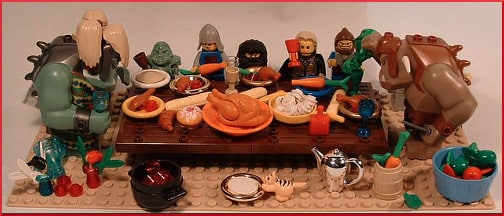 At Kansas State University, journalist Darrah Tinkler interviewed associate professor of psychological sciences Don Saucier about how eating can provide social validation, which means monkey-see/monkey-do behavior that allows a person to fit in and gain approval. Mammals developed group cohesiveness as a survival mechanism, and social attachments are even more vital for modern humans.
At Kansas State University, journalist Darrah Tinkler interviewed associate professor of psychological sciences Don Saucier about how eating can provide social validation, which means monkey-see/monkey-do behavior that allows a person to fit in and gain approval. Mammals developed group cohesiveness as a survival mechanism, and social attachments are even more vital for modern humans.
However, membership in any group always means paying dues. There is always a cost, and with families the price is that we are more emotionally vulnerable to them than to the general public. Dr. Billi Gordon points this out, naming many stress-related disease processes that can be exacerbated by family issues. Figuring out how to get along with the family—including at holiday feasts—is vital. Gordon says:
It becomes an issue of your health, your family’s health, and more importantly, as a parent, your children’s health, because viable family relationships are important to our basic biology. The stronger the family bond is the greater the likelihood of success and happiness for its members.
“Pop psychology” doesn’t get any more popular than that dispensed by Billi Gordon, Ph.D., a former actor and TV writer who transitioned from those careers into that of a neurologist specializing in the relationship between stress and obesity-related disease. Currently he is a researcher at UCLA’s Center for the Neurobiology of Stress and a blogger for the Los Angeles Times, the Huffington Post, and Psychology Today.
Also, in the past, Gordon has weighed 700 (and according to some reports, perhaps even as much as 1,000) pounds, so he knows all about compulsive overeating from the most intimate perspective. The winter holiday season, for instance, is the season to be not jolly, but “bingeing, psychologically distressed, and feeling out of control.” The psychological distress includes a lot of guilt and self-loathing. Of holiday binge eating, Gordon says:
It is a multifaceted, complex, socially encouraged pathological behavior. For normal eaters, holiday bingeing is circumstantial and not problematic, per se; for compulsive overeaters it’s a reoccurring nightmare.
Binge eating at this time of year even has a different name—“celebration”—and is expected and encouraged. Throughout human history, humans have gotten together for the purpose of overindulgence. It’s what we do. The meal is the event, and the event is the meal.
For one thing, holiday binge eating is inconspicuous because everyone is doing it, so the person with a problem blends right into the general festival of consumption. There are so many ways in which a human needs to be a part of society, and it is a shame that the most widespread and easy way is so destructive. Prof. Saucier gave an example of the difficulty:
The way people show their love and care for their family on Thanksgiving is through making their best dish for the Thanksgiving meal…So for social validation to take place, family members are forced to accept that gesture to make sure the cooks feel validated in their demonstration of affection.
The question here is this: how do we stop ourselves from overeating on holidays? Prof. Saucier suggests the method that preschools call “use your words.” Is it possible, in front of all these people, or while Aunt Ellen is carving a roasted fowl, to tell her how much she means to you? It is so much easier to just make sure she notices that you had two pieces of her pie.
Perhaps the most alarming of Saucier’s ideas is that acceptance of holiday overeating is unremarkable, and even expected. But he also says:
Simple social dynamics can be shifted to take away the pressure to overindulge…Social validation can still come from small portions.
How do we retrain ourselves to eat smaller portions? Glad you asked! With the help of the W8Loss2Go smartphone app, which is available at no cost right now. Also, any overweight person between the ages of 8 and 20 who wants to make history, and who can manage 4 trips to Kirkland, Washington, is encouraged to learn about the new upcoming pilot study of the W8Loss2Go application.
Your responses and feedback are welcome!
Source: “Psychology professor says social validation, meeting expectations among reasons we overeat on Thanksgiving,” MedicalXpress,com, 11/25/14
Source: “The Old Brain Says “Please Come Home for Christmas”.” PsychologyToday.com, 12/20/13 Dr. Billi Gordon
Source: “Christmas Cookie Blue.” PsychologyToday, 12/06/13
Image by floodllama

 FAQs and Media Requests:
FAQs and Media Requests: 












One Response